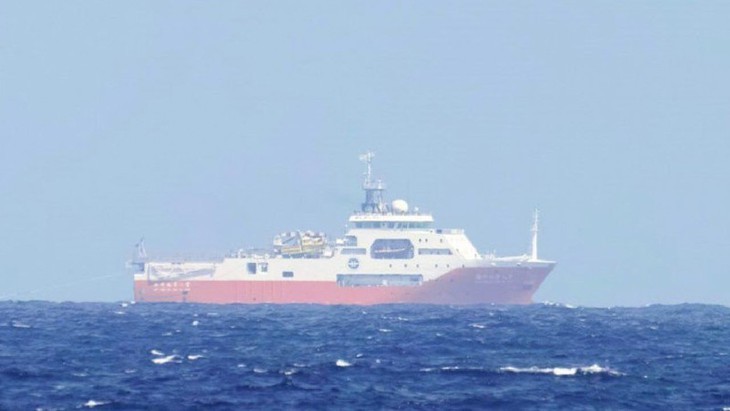(VOVWORLD) - Since early July, a Chinese survey vessel and its armed escorts have encroached on Vietnam’s exclusive economic zone. Vietnam has called on China to obey international law to maintain order, peace, and stability in the East Sea, and together with the international community has opposed China’s transgressions to protect Vietnam’s legitimate rights in the East Sea.
 Chinese Haiyang Dizhi 8 (Photo Weibo) Chinese Haiyang Dizhi 8 (Photo Weibo) |
The 1982 UN Convention on the Law of the Sea is a legal framework for all activities in maritime areas. Under the Convention, coastal states have exclusive economic zones, a 200-nautical mile continental shelf, and 12 nautical miles of territorial waters. Coastal states which claim sovereignty in the East Sea – China, Vietnam, Malaysia, Philippines, and Brunei – signed and ratified the UNCLOS in 1982.
Blatant violation of 1982 UNCLOS
It is confirmed that China has no “historical right” in the East Sea and the “buffalo-tongue” or “9-dash” line that it unilaterally draws violates the 1982 UNCLOS.
China’s sovereignty claim, based on its so-called “historical right”, is not defined in international law. In 2016 China’s sovereignty claims based on the 9-dash line and historical rights were rejected by the International Court of Arbitration in The Hague. Beijing has not accepted the PCA’s ruling and has persisted in trying to affirm its sovereignty by unilateral, illegal, coercive measures.
China’s activities on the Tu Chinh reef (Vanguard Bank) in Vietnam’s exclusive economic zone reveal China’s ambition. The Vanguard Bank is located within Vietnam’s 200-nautical mile continental shelf and is 600 nautical miles from China’s coast. Based on the 9-dash line, China claims the Vanguard Bank is in its EEZ. It has sent the Haiyang Dizhi 8 and its armed escort vessels to hamper Vietnam’s oil and gas exploration activities in Vietnam’s territorial waters. It’s not the first time China has done so. In 2017 and 2018 China forced Vietnam and its partner to halt oil and gas exploration in this sea area.
The world community has strongly condemned China’s actions. James Borton, an East Sea researcher from Tufts University, said that entering the territorial waters of Vietnam is a provocative act and does not respect Vietnam's sovereignty or 1982 UNCLOS. Beijing uses force to turn a non-disputed area into a conflict zone. Its actions endanger the geopolitical stability of the entire region, James Borton said.
Protecting sovereignty through legal, peaceful means
Vietnam has a 3260 km coastline. It has actively engaged in building and enforcing the 1982 UNCLOS.
During China’s encroachment on the Vanguard Bank over the past 3 months, Vietnam has complied with international law, in particular the UNCLOS, to protect its legitimate rights and interests in the East Sea. Vietnam has cited the UNCLOS, the Declaration on the Conduct of Parties in the East Sea (DOC) signed in 2001 between ASEAN and China, ASEAN’s 2012 6-point Statement on the East Sea, and the draft Code of Conduct in the East Sea (COC).
Vietnam insists that civilized states should respect the law. Pham Quang Vinh, former Deputy Minister of Foreign Affairs, said: “It is essential to abide by international law, particularly the 1982 UNCLOS, to ensure maritime peace, security, and order, and respect each country’s territorial waters, especially EEZ, and continental shelf. China’s activities are unlawful.”
Abiding by the 1982 UNCLOS is essential to maintaining peace, stability, security, safety, and maritime freedom in the region. Any state that uses or threatens to use force to annex, coerce, or resolve sovereignty disputes is uncivilized and should be excluded from the international community.